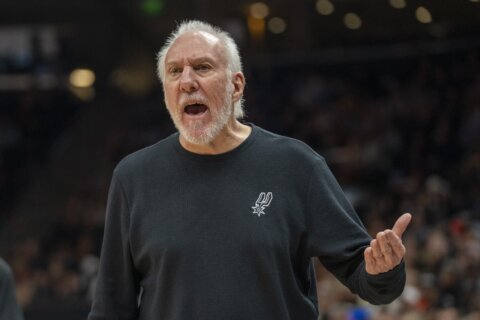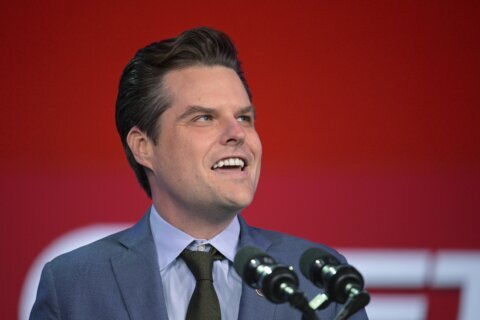Jesse Eisenberg did not know Kieran Culkin was about to drop out of his movie.
It was just a few weeks before shooting was about to begin on “A Real Pain,” and Eisenberg and much of the crew were already in Poland preparing. The film, which opens in theaters Friday, is deeply personal for Eisenberg, who at age 17 started connecting more with his own Polish heritage through his aunt.
The story, rattling in his mind for almost two decades, follows two cousins on a Holocaust tour after the death of their grandmother. It’s about modern pain and historical trauma — serious themes handled with the light, humorous touch of an odd-couple road trip film. One of them, David, is a little uptight, a little neurotic. The other, Benji, is a little more chaotic. You can guess which one Culkin had agreed to play.
“I connected with the character right away,” Culkin said. “I knew I wanted to do it. Like, creatively, I wanted to be a part of this thing.”
But the final season of “Succession,” in which he played the youngest Roy, Roman, stretched on longer than anticipated. Suddenly the time with his family he’d been counting on was disappearing under the crush of professional obligations and he wanted out. Word of this development came directly to Fruit Tree, the production company run by Emma Stone, Dave McCary and Ali Herting, who decided to keep it to themselves for a beat.
“We totally understood but we were also panicked,” said Herting. “He was meant to fly the next week and start shooting the next day. There wasn’t time to recast. The only ace we had up our sleeves was the fact that Emma had this very close relationship with him.”
Culkin described Stone’s phone call as a “reverse psychology thing.” Stone, wearing her actor, friend and producer hats, was understanding, honest and direct about the fact that his reasoning made perfect sense and also that the whole thing was going to fall apart without him. But that that wasn’t his problem, she said. She’d deal with it.
“She let me off the hook completely,” Culkin said. “And I think it was the moment I got off the phone that I was like ‘oh (expletive), I’m doing this movie.’”
It wasn’t the first or the last time that the fate of “A Real Pain” would hang in the balance. It was a struggle to even secure financing, until Topic Studios came along.
“We were desperate to be part of it,” said Ryan Heller, Topic’s vice president of film and documentary. “It had this clear arc for audiences and a huge opportunity to surprise with how deep and layered and complex and personal it was. That combination? It’s a rare thing.”
There were also the logistical complications of shooting in Poland, which would involve being the first production to film at the former concentration camp Majdanek, outside of Lublin, and the fact that Culkin was a bit of a live wire on set. The first week was particularly stressful, as everyone found their rhythm working together.
“Jesse and our director of photography ( Michał Dymek ) had had been meticulously shot listing because they were also so worried about the schedule and they wanted everything to be very precise,” Herting said. “And Kieran didn’t love it.”
He also found it hard to adjust to taking directorial notes from his scene partner. The result was tension. It was friendly, but palpable.
“It kind of fit with the movie though,” Herting said. “Like in the film too, they both soften and kind of started to meet in the middle. And then by the time we’re deeper into the story, they’ve really come together and there’s a sweetness and a bond. There’s a lot of mutual respect.”
Eisenberg learned to throw out his playbook and embrace the improvisation. Culkin started to appreciate that his director’s asks were part of a cohesive vision and not arbitrary. The result is something more alive and fun than Eisenberg could have ever planned for. They knew it was special, but now they’d face their next test: Audiences.
The Sundance Film Festival had always been the goal for “A Real Pain,” and they were rushing to finish the cut just days before it began. But they didn’t know what would happen there: If anyone would like it or buy it. Eisenberg’s first film, “When You Finish Saving the World,” had a more muted debut in part because the festival was virtual that year.
But with “A Real Pain,” they needn’t have worried. It was celebrated by audiences and critics and had distributors lining up to chat with Eisenberg moments after its premiere. The sale turned into one of those famous all-night sessions that are rarer and rarer for festival breakouts these days.
“These are companies that I’ve been pitching to for years,” Eisenberg said. “It was totally surreal and even embarrassing a little bit to be in a position like that because I wasn’t ready for it.”
The next day Eisenberg and Culkin were at lunch. Eisenberg couldn’t even find a moment to eat: He was too busy fielding calls. During one, he looked over at Culkin and flashed a big grin. There was good news coming, he knew. Ever the improvisor, Culkin snapped a shot of his director and co-star in that moment of triumph. Soon the world would know too that Searchlight had acquired it to the tune of $10 million, with a full-fledged theatrical commitment.
The journey of “A Real Pain” isn’t over yet. It’s awards season, after all, though Eisenberg winces at the idea that there’s “an element of judgment still to come.” It’s almost, he added, a Damocles (as in “sword of”) hanging over the experience.
And yet even he and Culkin have been excited that it’s resonating with audiences and not even in the same ways. Benji, it seems, gets a different response everywhere they go. At the Telluride Film Festival, it was “a laugh a minute” for everything he did. In London, Culkin said, “it was quite the opposite.”
“They were not charmed by him,” Culkin said. “But they were connected and listening and I thought that was very, very interesting and very cool. Like, no matter what your feeling is on that guy, people are still connecting with it.”
The litmus test might be in Daniel Oreskes’ character Mark, a somewhat minor role that Eisenberg had written specifically for an actor he loves. While the others in the Holocaust tour group are discussing how great Benji is, Mark deadpans: “Forgive me if I don’t see this magical spark.”
“He’s just a lens, but he speaks to half the audience usually every night,” Eisenberg said. “The movie is not telling us that this is our hero.”
Eisenberg had originally written Benji with the idea of playing the part himself. This was an idea he was talked out of. It would simply have been too much on his plate. He’s glad about getting the “easy” role in David. But one actor’s idea of easy is another’s nightmare. Just ask Culkin whether or not he could play Eisenberg’s part.
“There’s just no way,” Culkin laughed. “I just couldn’t.”
Copyright © 2024 The Associated Press. All rights reserved. This material may not be published, broadcast, written or redistributed.







